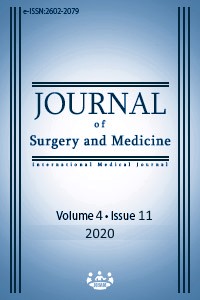The relationship between AB0 blood groups and COVID-19
Keywords:
Blood Group, COVID-19, Pandemic, InfecitonAbstract
Aim: Although COVID-19 infection spreads very quickly, not every individual is infected at the same rate. It should be investigated whether blood groups affect this difference in susceptibility to COVID-19. This study was conducted to investigate whether there was a relationship between AB0 and Rh blood groups and COVID-19 patients. Methods: A total of 535 patients suspected of COVID-19 who were admitted to the emergency departments and pandemic polyclinics of 3 different hospitals were included in this prospective cohort study. The patients were divided into two groups as those with positive and negative results according to the swab test. According to the ABO and Rh subgroups of the patients whose blood groups were known, each patient was evaluated for the presence of COVID-19. The data on patients' age, gender, complaints during the admission, blood groups, and swab test results were recorded in the study forms, and statistical analyses were performed. Results: The mean age of the patients was 45.5 (22.2) years. There were 291 (54.40%) males and 244 (45.60%) females. It was observed that most patients had A Rh + blood group (n=225, 42.1%). When age groups were compared in terms of gender, swab test results, and blood groups, no significant differences were found (P=0.307, P=0.316 and P=0.694, respectively). Conclusion: We found that no specific blood group increased the risk of getting infected with COVID-19. However, according to our results, those with A Rh – and A Rh +, 0 Rh - and AB Rh - blood groups had a higher risk of catching COVID-19, while those with 0 Rh + blood group had a lower risk.
Downloads
References
Zhu J, Zhong Z, Ji P, Li H, Li B, Pang J, et al. Clinicopathological characteristics of 8697 patients with COVID-19 in China: a meta-analysis. Fam Med Com Health. 2020;8:e000406. doi: 10.1136/fmch-2020-000406.
Chen N, Zhou M, Dong X, Qu J, Gong F, Han Y, et al. Epidemiological and clinical characteristics of 99 cases of 2019 novel coronavirus pneumonia in Wuhan, China: a descriptive study. Lancet. 2020 Feb 15;395(10223):507-13. doi: 10.1016/S0140-6736(20)30211-7.
Batool Z, Durrani SH, Tariq S. Association Of Abo And Rh Blood Group Types To Hepatitis B, Hepatitis C, Hiv And Syphilis Infection, A Five Year' Experience In Healthy Blood Donors In A Tertiary Care Hospital. J Ayub Med Coll Abbottabad. 2017 Jan-Mar;29(1):90-2.
Lindesmith L, Moe C, Marionneau S, Ruvoen N, Jiang X, Lindblad L, et al. Human susceptibility and resistance to Norwalk virus infection. J Nat Med. 2003 May;9(5):548-53..
Jing W, Zhao S, Liu J, Liu M. ABO blood groups and hepatitis B virus infection: a systematic review and meta-analysis. BMJ Open. 2020;10(1):e034114. doi: 10.1136/bmjopen-2019-034114.
Gu J, Korteweg C. Pathology and pathogenesis of severe acute respiratory syndrome. Am J Pathol. 2007;170:1136–47.
Cheng Y, Cheng G, Chui CH, Lau FY, Chan PK, Margaret HL, et al. ABO blood group and susceptibility to severe acute respiratory syndrome. JAMA. 2005;293(12):1450-1. doi: 10.1001/jama.293.12.1450-c
Cooling L. Blood groups in infection and host susceptibility. Clinical Microbiology Reviews. 2015;28(3):801-70. doi: 10.1128/CMR.00109-14
Zhu N, Zhang D, Wang W, Li X, Yang B, Song J, et al A novel coronavirus from patients with pneumonia in China, 2019. New Engl J Med. 2020;382:727–33.
Zhou F, Yu T, Du R, Fan G, Liu Y, Liu Z, et al. Clinical course and risk factors for mortality of adult inpatients with COVID-19 in Wuhan, China: a retrospective cohort study. The Lancet. 2020;395:1054–62.
Wang D, Hu B, Hu C, Zhu F, Liu X, Zhang J, et al. Clinical characteristics of 138 hospitalized patients with 2019 novel coronavirus–infected pneumonia in Wuhan, China. JAMA. 2020;323(11):1061.
Fang L, Karakiulakis G, Roth M. Are patients with hypertension and diabetes mellitus at increased risk for COVID-19 infection? Lancet Respirat Med. 2020;8:e21.
Chen J, Subbarao K. The immunobiology of SARS. Ann Rev Immunol. 2007;25:443–72.
Juyi L, Xiufang W, Jian C, Yi C, Aiping D, Ming Y. Association between ABO blood groups and risk of SARS-CoV2 pneumonia. Br J Haematol. 2020 Jul;190(1):24-7. doi: 10.1111/bjh.16797
Zhao J, Yang Y, Huang H, Li D, Gu D, Lu X, et al. Relationship between the ABO Blood Group and the COVID-19 Susceptibility. medRxiv preprint. 11 March, 2020. doi: 10.1101/2020.03.11.20031096.
Göker H, Karakulak EA, Demiroğlu H, Ayaz MC, Büyükaşık Y, İnkaya AC, et al. The effects of blood group types on the risk of COVID-19 infection and its clinical outcome. Turkish Journal of Medical Sciences. 2020;50:679-83. doi: 10.3906/sag-2005-395.
Wua Y, Fengb Z, Lia P, Yua Q. Relationship between ABO blood group distribution and clinical characteristics in patients with COVID-19. Clinica Chimica Acta. 2020;509:220–3.
https://www.kanver.org/EKutuphane/GruplamaLaboratuari, erişim; 16 Mart 2020
Downloads
- 722 1206
Published
Issue
Section
How to Cite
License
Copyright (c) 2020 Ali Gür, Muhammed Ekmekyapar, Levent Şahin
This work is licensed under a Creative Commons Attribution-NonCommercial-NoDerivatives 4.0 International License.
















